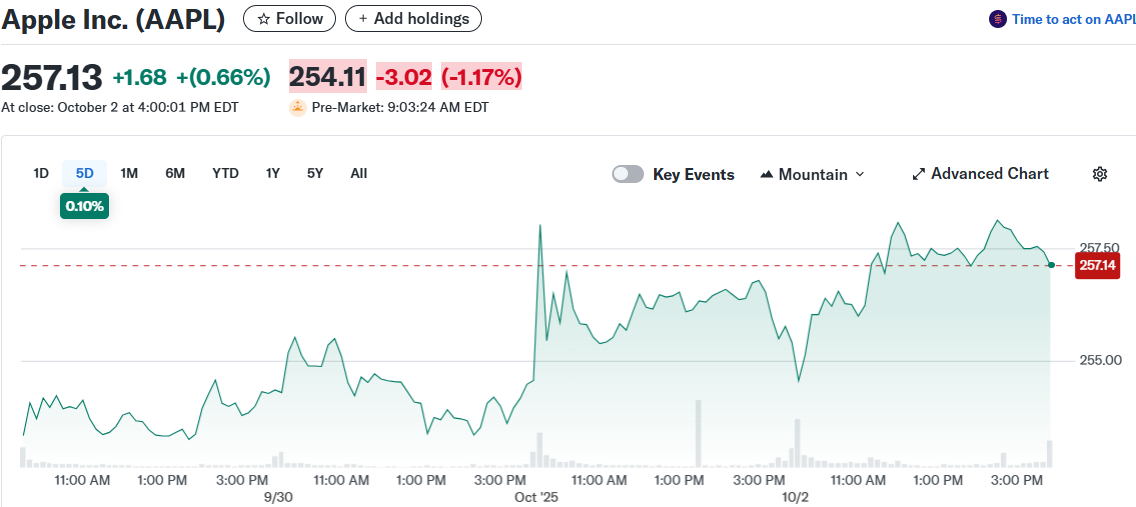TLDR
- Jefferies downgraded Apple stock to Underperform with a price target of $205.16, down from $205.82
- Analysts warn that expectations for the iPhone 18 foldable are unrealistic and already baked into the stock price
- A planned $100 price hike for iPhone 18 Pro models could hurt demand without breakthrough features to support it
- The iPhone Air’s thin design failed to resonate with buyers, raising doubts about foldable iPhone success
- Apple stock fell 1.1% in premarket trading to $254.34 following the downgrade announcement
Apple stock took a hit Friday as Jefferies downgraded shares to Underperform from Hold. The firm also trimmed its price target to $205.16 from $205.82.

Shares dropped 1.1% to $254.34 in premarket trading. The downgrade comes as analyst Edison Lee warns that market expectations have outpaced reality for upcoming iPhone models.
The core issue centers on the iPhone 18 foldable. Jefferies estimates sales will reach just 12.5 million units annually when the device launches.
Apple’s current stock price suggests investors expect more than double that volume. This disconnect creates what the firm calls “excessive expectations” that could disappoint shareholders.
iPhone 17 Demand Already Priced In
Jefferies raised its iPhone unit forecasts to 7% growth for fiscal 2025, 1% for fiscal 2026, and -1% for fiscal 2027. These numbers beat previous estimates of 5%, -3%, and 0%.
Despite the upgrade, analysts believe improved iPhone 17 demand is already reflected in the stock price. Much of that demand stems from a price cut on the base model rather than innovative features.
The iPhone 17 lineup introduces the iPhone Air, touted as the thinnest iPhone ever. Consumer response has been weak, which Jefferies sees as a red flag for foldable models.
If buyers don’t care about ultra-thin designs, betting on foldable iPhone success becomes risky. This lukewarm reception factors heavily into the firm’s bearish outlook.
Price Hikes Without Innovation
Jefferies expects Apple to raise iPhone 18 Pro and Pro Max prices by $100. Without compelling new features, this strategy could backfire.
Price-driven replacement cycles lack staying power, according to the firm. Consumers may resist paying more unless they see clear technological advances.
The analysts ran a discounted cash flow analysis incorporating the planned price increase. Results showed minimal change in Apple’s fundamental value despite higher pricing.
This suggests the stock is overvalued at current levels. Apple trades near its 52-week high of $260.10 with a market cap of $3.82 trillion.
Margin Pressure Ahead
Without envelope-pushing features to justify premium pricing, Apple could face margin pressure. The firm’s fiscal 2025 revenue growth forecast stands at 6%.
Jefferies maintains a cautious stance for fiscal years 2026 and 2027. The combination of aggressive pricing and conservative foldable projections drives this outlook.
Market futures for the S&P 500 and Nasdaq Composite remained flat following the downgrade. Apple’s financial health score sits at 2.88 out of 5, though valuation concerns persist.
The firm’s analysis suggests current stock prices imply an “overly bullish iPhone outlook.” Apple stock has gained throughout 2025 but now faces questions about whether the rally went too far.





